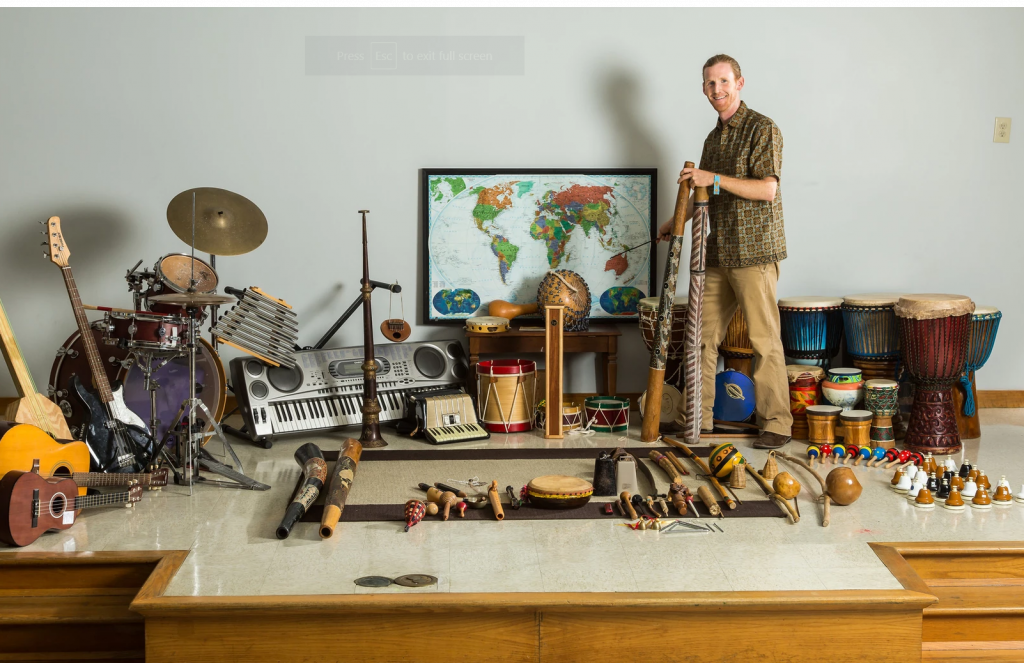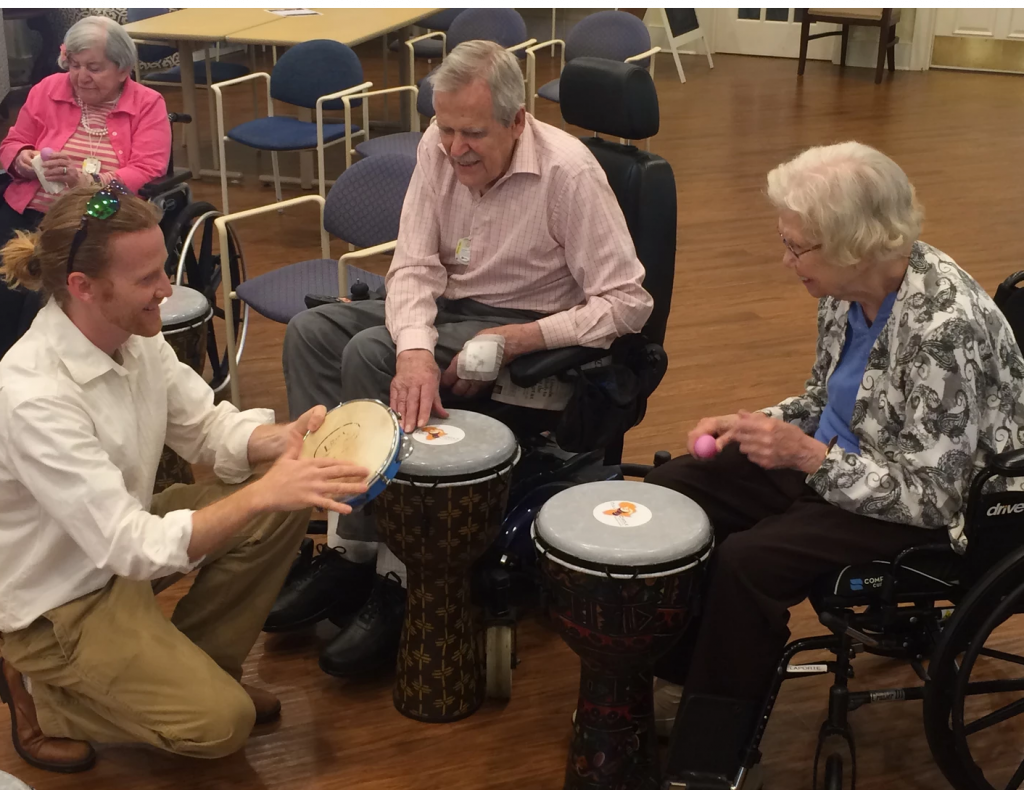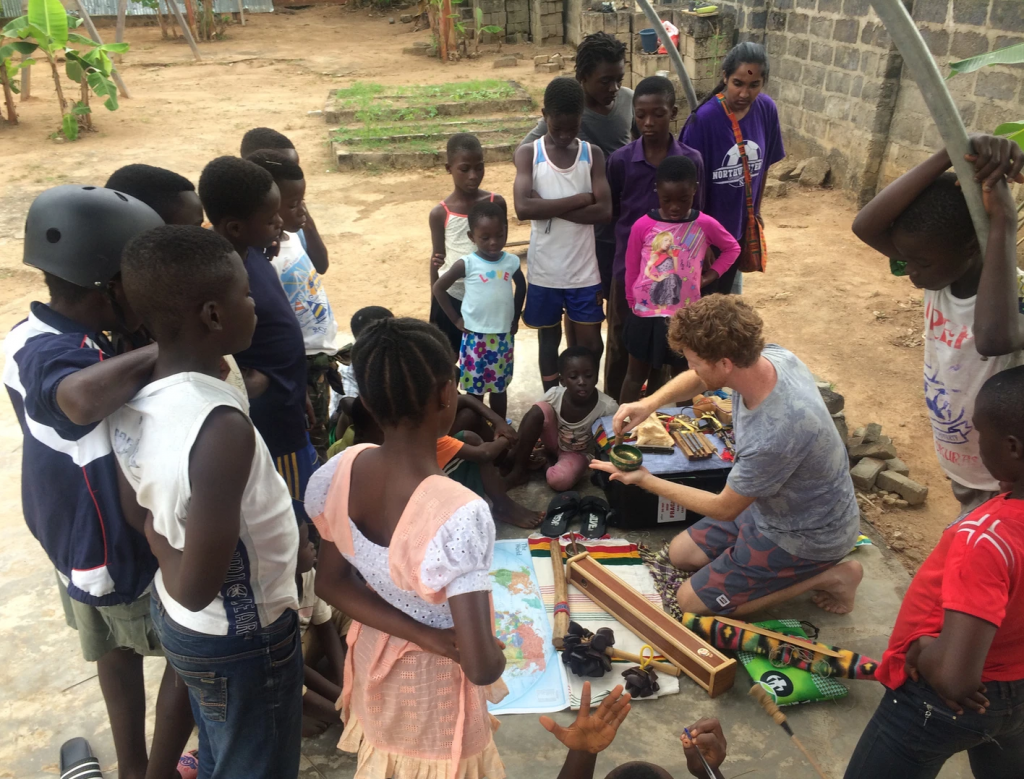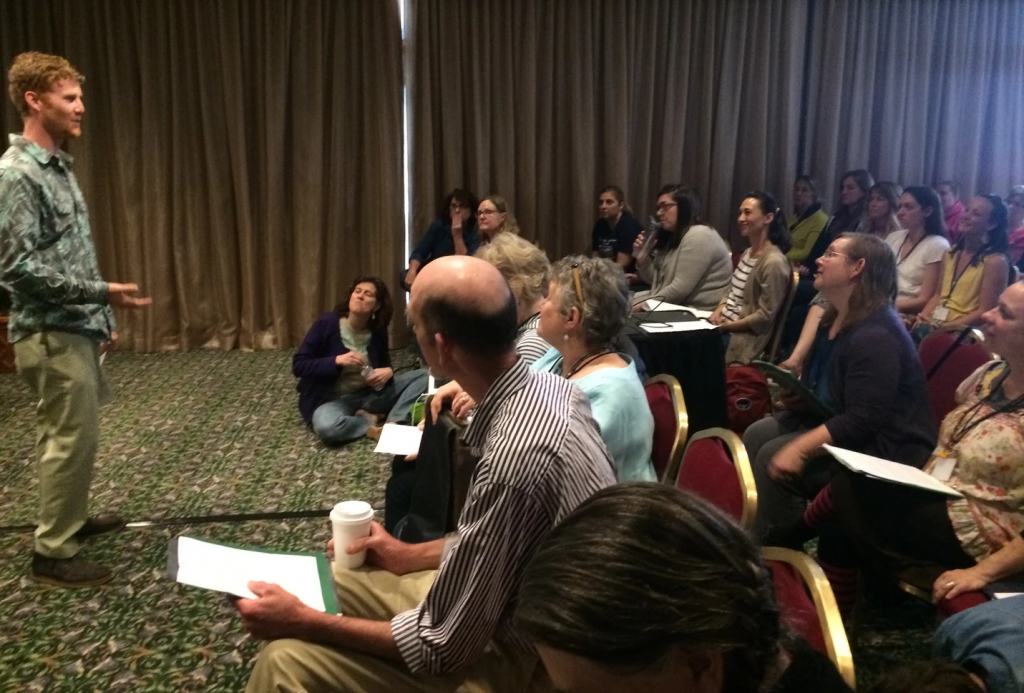The Montessori Post interviewed Daniel Scruggs, international music educator based in South Carolina.


It’s noted that you’ve given presentations at a program for individuals with dementia; at a juvenile detention center; to young children with special needs; at a bereavement camp for youth and several school locations. What have you noticed about participants’ responses to the program in these various settings?
Some of the really notable experiences are in places very far away where I could only speak a few words of the native language. It was here that I experienced the truth that music is the universal language, and we can say so much without words when our intention is to connect with others. In my experience, people of all cultures are generally welcoming when a visitor comes to their community with humbleness and respect.
Folks that I drum with in retirement communities break a little piece of my heart when sometimes, after almost having to pry the drum out of their hands at the end of a session, they quip that they should have been doing this fifty years ago! They usually then share a familiar story of how someone, when they were very young, told them that they were no good at music or that they had a terrible singing voice, or that they weren’t born in the right culture to express themselves in a certain way. This shut their heart off from ever considering playing an instrument again. It’s bittersweet, because I get to share these golden moments with them and wish we had fifty more years to play in that joyful state together.
It brings me joy when sharing lessons with young men and women serving time in juvenile detention, seeing them come alive with a glow from within as they recall the music they love that makes them think of better times and offers hope of starting a new life of freedom. I’m humbled recalling times playing drums with incarcerated adult men and women and seeing the childlike wonder and ease come into their faces and bodies after we’ve played a drum session together. And I remember thinking that I’ll never look at anything the same after sharing music and instruments with refugees in Cairo that had fled their native lands for asylum in Egypt. Before our time together, their food, clothing and shelter needs overshadowed their ability to seek out opportunities to recall their love for the rich music and rhythms of their native culture.
What types of instruments do you share during a presentation?
I usually share around twenty different instruments during a one hour presentation. My collection numbers around 140 unique instruments from six continents as well as many relics and artifacts collected from around the world. Much of my collection could be considered organic, traditional or indigenous and made out of natural materials, some very old and some contemporary. I also have many cutting edge pieces of digital music making equipment and instruments that I use to share lessons about the evolution of different styles of music making and the wonders of technology.

Tell us about your background and what has drawn you to this work.
As long as I can remember I’ve been fascinated with different cultures, nature, community, instruments, music and geography. I grew up in Williamsburg, Virginia, and often rode my bike by the sites where Native Americans first encountered Europeans, and where the first enslaved Africans arrived onto the shores of America at Jamestown in 1619.
Upon encountering the Montessori method as an adult, it occurred to me that I had always loved learning, but loathed most of the time spent each day at my school. My mom says she still remembers seeing the glow drained from my face between second and third grade when school stopped engaging me. She also recalls how not soon after, I declared adamantly that I was dropping out of school. I had terrible anxiety during this time and dreaded waking up to spend the day at the school, a place that just a couple years ago I dearly loved. In seventh grade I was diagnosed with a learning disability that led to me being relegated to special classes where often our daily tasks were coloring printed pictures or watching TV while the teacher caught up on paperwork.
I recall barely getting through high school, and finally graduating due to much encouragement from my mom and constant coping through music and an insatiable curiosity. College was nine years of chasing a degree in Sociology by way of sporadically focused studies in music, percussion, anthropology and Arabic language.
I started collecting musical instruments in my early-teens and during college years would regularly share them through group and individual lessons with the children in the government housing projects behind our dorm and other places around town where people congregate. Over time this evolved into partnerships with organizations that work with at risk children such as Boys and Girls Club, Americorps, and WINGS for Kids.
From the moment I was introduced to Montessori education, I was hooked. I was welcomed to share weekly classes at Sundrops Montessori Schools in Charleston, South Carolina and after a few years became full time, first as an Assistant in an elementary classroom, then as the music and culture educator for the three campuses. I reckon that Montessori education resonates with me so much because it is intuitive, practical and effective in fostering self-empowerment and purpose in students. At the same time, the Montessori method fosters a lifelong love of learning, peace, recognition and appreciation of the “cosmic connections” between everything.
I’ve often spoken with Montessori educators and students and shared that I can’t imagine who I’d be and what I’d be doing if I’d had a formative Montessori education that encouraged and supported my full potential as a curious person and challenged learner. I see now that my disdain for traditional education was a product of long periods of confinement to desks, an absence of creativity and respect for each person’s unique worth, and utter lack of value placed on wonder and the interconnectedness of all things. It’s taken me two decades to put together the pieces that allowed me to realize that I had all the while been seeking out my own path of learning. This path of self-guided learning seems to have converged with my introduction to Montessori education at the exact right time. Now my intention is to always reveal my highest potential as a person and show up as the teacher that I always wished I had in those dreary days of school.
What do you hope people take away from a session with you?
My hope ultimately is for people to fall in love with learning and be inspired to share what they are passionate about with others. I do my best to relate things that have helped me to connect more effectively with different people. Things like: meet folks where they’re at. Be prepared enough to be in the moment and share the lesson and subject material with compassion and authenticity. That comes by doing it again and again and again. One of the essential requisites of a teacher is to connect with and inspire their students. Everyone is a student and a teacher and we must continue to learn. I emphasize this to children as well as adults because we grow up sometimes creating beliefs about what we are and what we are not and these limit us from exploring our deep curiosities and inevitably limit our potential.
Also, it’s important to me to emphasize, through actions and lessons, rather than words, the truth that everyone and every culture has inherent dignity and is an integral piece of the whole. Each person and group are worthy of being treated as someone of intrinsic value and incalculable potential. We can choose to lift each other up through our words, actions and beliefs or pull them down with them.
Two classic quotes that really resonate with me in regards to this question: “We do not inherit the earth from our ancestors, we borrow it from our children” and “be the change you wish to see in the world.”

You are a founding member of the World Music Festival in Ghana. Can you tell us more about this annual event?
The Nkabom World Music and Culture Festival was a vision that became reality through the work of an extraordinary organization called Project OKURASE. This organization, along with Sundrops Montessori School in Charleston, also founded the first Montessori school in Okurase, Ghana, a few years ago. Travelers, educators, school groups, scholars and medical professionals visit the village of Okurase throughout the year and each summer for cultural enrichment, history, wildlife and nature, as well as the annual Village Health Outreach. This annual event brings together dozens of healthcare professionals from around Africa, the US and Europe to offer free healthcare to over a thousand local people over the course of a week.
Okurase is a drum making village and I learned about it when a boy named Francis Yevuga was brought from there to Charleston to have his eyes examined and diagnosed because of progressive vision loss. A team of doctors, led by Dr. Cynthia Swenson (Co-founder of Project OKURASE) facilitated Francis’ care and well-being over the course of a year visit. Francis was removed from school around age four because of his failing sight and taken under the wing of a Master Drummer and instrument builder named Samuel Yeboah, whose nickname is Powerful (Co-founder of Project OKURASE). When I met Francis he was around twelve years old, and by all accounts performed West African rhythm at the skill level of a Master drummer. He was enrolled in my class and upon his arrival at Sundrops Montessori we became generally inseparable because I had a music and culture room filled from ceiling to floor with instruments and cultural relics that he could escape to and regenerate. Francis often had overwhelming culture shock. Though he rapidly learned the nuances of being an American kid, he initially spoke no English, had never experienced running water, hot water or a flushing toilet, and also could only see a small window of vision out of the periphery of his right eye. Francis seemed to inspire everyone he encountered through his positive spirit and lighthearted personality.
After that year together, Francis’ visa expired and he had to return to Ghana. I decided to make the trek back with him in hopes of easing his transition back home. This trip marked a different chapter in my life, much healing, much connection, much realization. I was welcomed by the village in spectacular fashion, and my spirit will be eternally grateful for the love that I was shown by the community that embraced me and taught me so much.
The next year Sundrops Montessori did a fundraiser and instrument drive so that Francis could have a music room of his own in the village. Building the music resource center would be a way to keep Francis engaged in learning and create further skills to support himself as he got older.
The Nkabom Festival is an extension of that vision of music, community development and education. I realized being in Okurase that I had taken for granted growing up in a place that offered access to countless arts and music performances almost every day of the week. It became a priority to collaborate with my Project OKURASE family in Ghana and Charleston and through social media to raise funds that would allow for the infrastructure to have a large scale event that could both expose the talent of the artists in and around Okurase, and also offer the community an opportunity to experience a medium where they could come together to celebrate music and arts from their culture and others from throughout the world. We also hold a sister festival in Charleston as a fundraiser and bridge of consciousness to Ghana and our African connections in the Lowcountry.
The festival has brought many people together and given a range of performers an opportunity to showcase their talents and passion. It’s brought many opportunities for experiential learning in things as various as communication, logistics, infrastructure, organization, budgeting, sound, stage and light design, waste management and recycling, media, food service, security and more. We are always looking for more people to support the efforts to make the festival happen, as well as folks to come and attend the festival in Okurase! Project OKURASE has been offering tours, cultural immersion and service learning experiences in Ghana for over ten years.

You have given training at several Montessori institutes and conferences. What do you hope Montessori teachers take away from your presentations?
In my teacher enrichment workshops that feature group drumming as a team building component, I explain to educators that part of the purpose of group music making, and specifically drumming together, is for them to remember the anxiety that they experienced as a child when learning something new in a group setting. We have to be careful of what we tell ourselves regarding what we can and can’t do. Everyone, with a little exploration, research, and dedication can teach others something about music and culture. I know this to be true and the same applies to any subject. When a person is ready, they can begin sharing what they know with others and then their next teacher will show up when the time is right. Inevitably, we become somewhat of a specialist in conveying knowledge as we continue pursuing a specific learning path.
At most teacher training and presentation opportunities, I tell people that one of my main objectives is for them to be inspired to want to learn more about something that they love and then share it with others. I use the medium of music and cultural education to model the nearly infinite depth of knowledge that can be learned about something of interest, and perhaps more importantly how fun and exciting it can be to share something that you’re interested in and passionate about with others. We all have a series of choices to make throughout our lives, and each choice leads us to another: choose your own adventure, learn everything you can! The more we know about ourselves and others, the more choices we have and the freer we are.
Learn more about Daniel Scruggs at RhythmMovesLive.Com